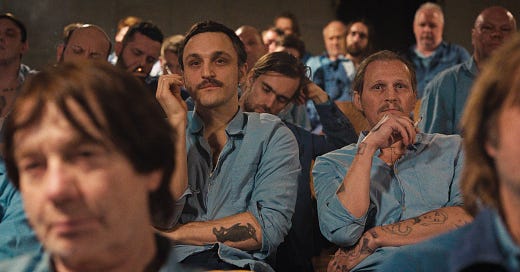In Richard Dyer’s book Only Entertainment, he presents a theory that films that emphasize sensory qualities contain more purpose and connection to the fundamentals and origins of cinema - like when the Lumiere Brothers shocked audiences with footage of a train arriving at a station. This theory has been used in various situations, from justifying the monopolization of spectacle-based films to the validity of comic book movies as cinema.
Great Freedom is the perfect example of this theory employed in an art film environment. The movie isn’t especially dialogue or plot-driven, but it uses strong sensory details to embellish the experience. The sharp use of light and cavernous sound design is unrivaled and eerily depressing.
The film follows Hans Hoffman, simultaneously telling the story of his multiple incarcerations - spanning from 1945 to twenty years later. Imprisoned in Germany for homosexuality, Hans (played by Franz Rogowski) explores himself and his surroundings during the different periods.
Director Sebastian Meise uses human discomfort to create an entirely unpleasant environment - claustrophobic, airless spaces devoid of color, with ghostly sounds bouncing off of the walls. Any glimpse of natural light makes us, as viewers, reach for the fresh air, trying to get a break from the slowly building terror of the movie.
Franz Rogowski dominates the movie as Hans, commanding our attention through a reserved performance that unearths deep inner emotion and disobedience. He builds his character as someone who is incredibly raw but soft-spoken, as someone who does not necessarily take pleasure in subversion and rebellion but rejects feelings of shame nonetheless.
Great Freedom’s main fault for its enjoyability is its pacing - it drags on forever and is not traditionally enjoyable. This is definitely intentional but frustrating. There were times when I felt this nauseous tedium drown everything out, which yielded an immersive experience, but an unpleasant one at that. By its conclusion, the film is a fully-formed and devastating look at incarceration and identity. Despite the relatively compact production, it is a massive and daunting story to take on. Great Freedom’s intimacy is oddly but effectively mirrored by its incredibly intimidating craft.
Great Freedom was released digitally in the US on May 6, 2022, and is currently streaming on MUBI.





one dog's facing east and one dog's facing west . . .